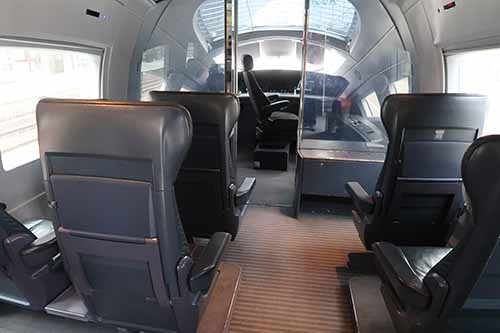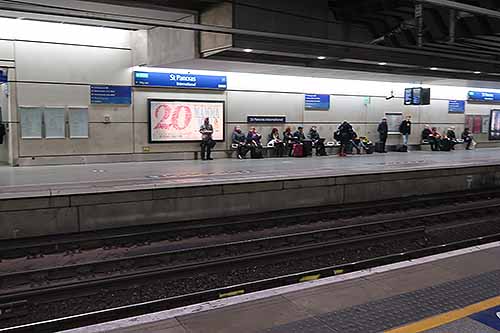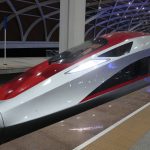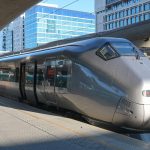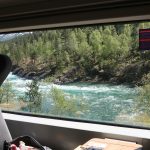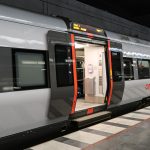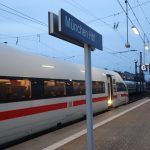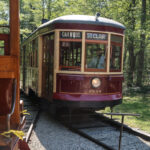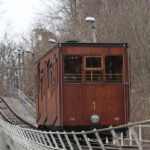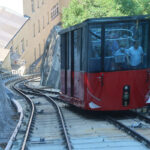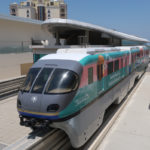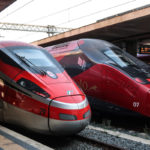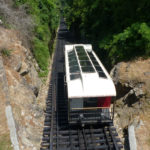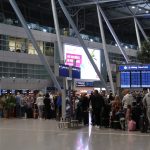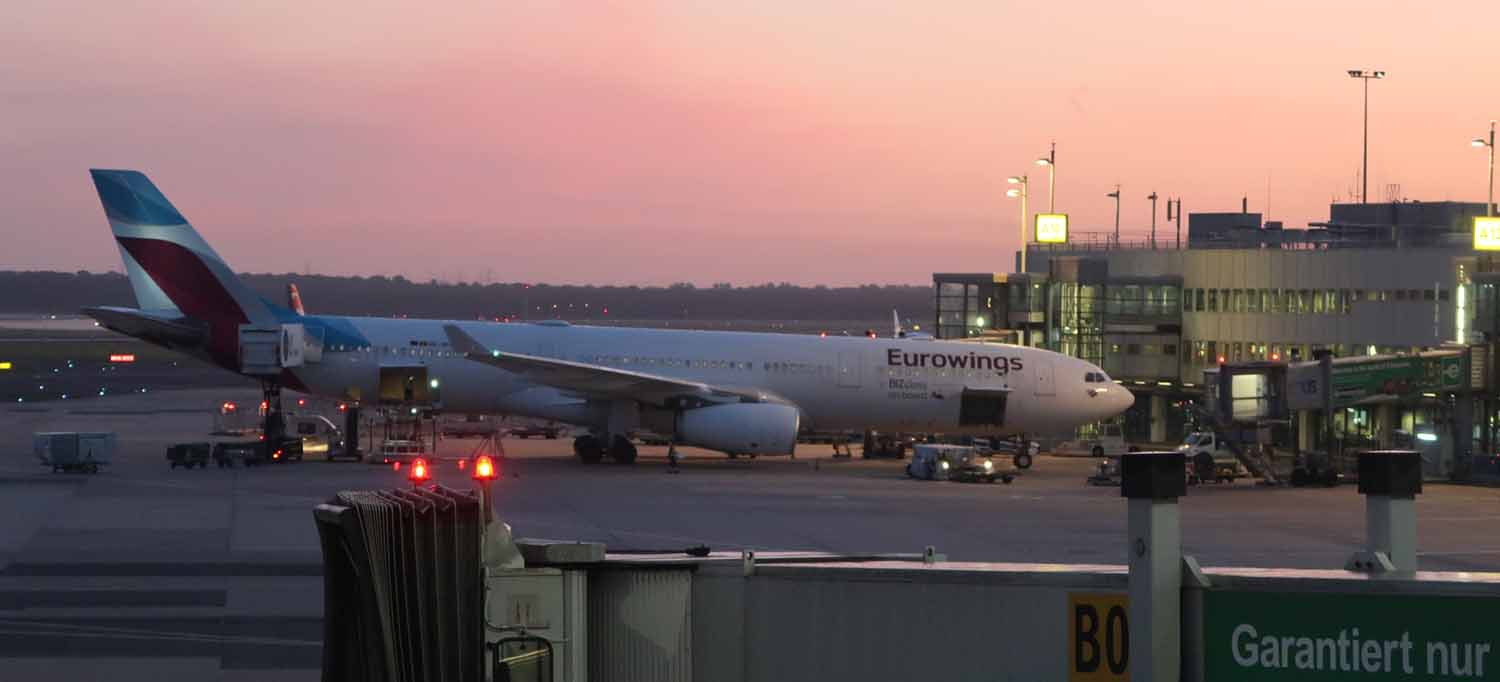I try to increase my volume on pure blogging posts, in which I give my personal opinion on certain topics. One of them, which pops up in German media almost weekly currently are discussions about direct train connections between Germany and London. There are some options regarding ICE trains which could run directly into the British capital. Currently, the typical way to get to London by rail from the Greater Cologne area I live in is by a transfer in Brussels. I give you my – not that optimistic – thoughts about a better option.
Trains from Germany To London – How does it work currently?
The typical way to get from Germany to London (which means St Pancras Intl station) is via Brussels. The most popular option is likely to use the former Thalys, which is now part of the Eurostar company. You transfer in the Belgian capital. From there, there are direct Eurostar connections to London. There also used to be the opportunity to have a transfer from the German ICE train (from Frankfurt and Cologne) to the Eurostar there. However, you cannot get saver tickets any more. If you are coming from Northern Germany, you might also take a transfer in Amsterdam, which features three direct services into the British capital.
The downside of the transfer is that you should at least have a buffer of one hour for the transfer in Brussels. You have airport style luggage checks (all luggage, passport controls etc.) – technically, you already immigrate to the United Kingdom in Brussels. This is handy once you disembark there – but takes some time before the train ride. On the way from London to Germany or other destinations, these checks take place at St Pancras International. Thus, you need to be there rather early, but therefor can have significantly shorter transfer times in Belgium. This, of course, also means that you need to have reliable and somehow in time connections (especially if you go for separate tickets). To be fair, neither the German ICE connection nor the Eurostar from the Ruhrgebiet and Cologne to Brussels and Paris is are good in that regard.
Trains from Germany To London – What would that mean?
The discussions about a rail connection from Germany to London are lasting for over a decade. For the 2012 London Olympics, there were some initial plans for that. One key challenge was that German ICE trains were thought to be too short and thus unsafe for an evacuation under the Channel. The regulations in that regard have been eased and there have been checks that even a two section ICE would not be a safety risk. However, more than ten years ago, plans are very vague. The most likely scenarios would be a direct connection from Cologne or Frankfurt to the United Kingdom.
Recently, there have been ideas about a direct rail link between Berlin and London. As Great Britain is neither part of the European Union nor of the Schengen Area, this would be an absolutely ridiculous idea. I will elaborate on that in a subsection below. By the way, Germany is not the only country which is debating about a high speed rail connection to London. However, the discussions about having a train from Geneva or Basel in Switzerland to London feel to be a bit more sophisticated and structured. While I could not find any equivalent to that for German plannings, there is a very nice article (almost a paper) on the Swiss channel travelnews.ch (in German). Many of the challenges discussed there are valid equivalently for a potential German connection.
Berlin To London? Why I feel that this is (almost) the worst option
The idea of connecting Berlin with London directly absolutely surprised me. I feel that this option would more or less boost all disadvantages you would already have if you started in Cologne or Frankfurt (which I see as the most probable candidates). Here are some points, why I feel that this idea is purely ideological, but does not have any chance to stand realistically:
- Berlin is indeed the largest city in Germany. Its commuting area, though, is small, especially compared to the Ruhrgebiet. An international train station in Cologne could easily serve ten to fifteen million people in a one hour train ride distance.
- You need to be aware that once you departed on that train in Berlin, you would technically be on British soil already. The train could stop to add passengers, but you could not leave the train. Stations en route which allow you to embark (and to disembark on the way bag) need to meet certain requirements to host all the passenger checks necessary.
- In general that means that you will have limited stops. However, you are either blocked by other trains or need to free time slots on which a Berlin to London train would have clear tracks. I feel that this is very hard to reach, especially including a certain level of robustness against delays of that train or of other operations.
- The Swiss article names some interesting implications on that point. There are no special rules for driving times of train drivers, but they have to follow the general rules for European workers. This means that after six hours, a train driver (and all the train staff as well) need to have the opportunity to have a 30 to 45 minute break (depending on the length of the total shift). The total connection time between Berlin and London would likely be around seven to eight hours. This means that you have had to have a second crew onboard – or exchange them somewhere, with all the border control and custom implications this would have.
- Some other implications named in the article are the likely higher volume of luggage, but also the capacity of the bathrooms, waste management and providing sufficient food and nutrition to potential passengers.
- There are also political implications. British Border Force would have to be allowed to do their work on German soil. I feel that this is somehow solvable.
Berlin To London Could Mean Weird Ticket Pricing
Let’s assume we would had a train from Berlin to London. Due to the work time implications, it makes a technical break in Cologne to exchange the crew. The city is more or less in the middle of the trip. As the train is stopping anyway, people can also board the train there (but there was no unboarding). As a person boarding the train in Cologne is blocking the seat also for the journey from Berlin to Cologne (as nobody can leave the train there), the ticket price would have to be almost the same like the entire from Berlin. The price might be just slightly lower, allowing for effects like a lower necessity for staff, usage of electricity, facilities etc. You don’t have that situation in European rail travel so far, apart from Eurostar trains to London and in night / sleeper trains, where many stops are typically boarding or unboarding only. For the current Eurostar connections from Paris or Brussels to London, the effect is not that important as the departure stations are comparably close to each other and the journey thereafter is rather long.
A Check Into Eurostar
I picked a random Eurostar train from Amsterdam to London, to see how they are doing it. The first train from the Dutch capital to the United Kingdom has five stops. I gave the times below in Central European Summer Time. In local time, the train arrives in London at 9:57.
| ES 9115 on 15th August 2025 |
Time (CET) |
| Amsterdam Centraal dep |
6:40 |
| Rotterdam Centraal arr |
7:23 |
| Brussels Midi / South arr |
8:38 |
| Lille Europe arr |
9:25 |
| London St Pancras arr (time in CET!) |
10:57 |
I looked up the prices for Standard Class (the lowest) and Premier (the poshest) tickets on that trip from each and every station at the time of writing this section (20th July 2025)
| ES 9115, 15th August 2025 |
Standard Class, € |
Premier Class, € |
| Amsterdam Centraal |
110 |
365 |
| Rotterdam Centraal |
n/a |
365 |
| Brussels Midi / South |
236 |
325 |
| Lille Europe |
236 |
325 |
| London St Pancras |
— |
— |
Very roughly, you made half of the trip in Brussels. The ticket from Rotterdam is not even sold in Standard Class. Other direct connections available that day range between 160 and 200 EUR. The price difference in Premium Class is minimal, regardless of the departure airport. You obviously cannot buy tickets within Continental Europe for that connection. The Amsterdam price might also be lower to be competitive against the alternative of flying between the cities (you might in fact be faster by plane, while the Eurostar is definitely faster than the plane – city to city – from Brussels). Of course, part of the story is also that the Eurotunnel as such is the “most expansive” part of the route.
Competitive Pricing?
I could imagine that this would be accepted for trains from Germany to London driven by Eurostar (which is still, somehow, a rare experience for many travelers), but not accepted if the trains are driven by Deutsche Bahn. For the same day, by the way, the connection from Cologne to London (6:30 hrs travel time), including the necessary transfer, was 216 to 298 EUR Standard Class / 424 EUR Premier.
Regarding the price, Eurostar is currently not competitive to flying. There is a morning service from Cologne/Bonn Airport (CGN) to London Heathrow (LHR) by Eurowings. On that day, you pay 139 EUR basic fare / 193 EUR Economy with luggage. BizClass / Business Class is 239.99 EUR.
Trains from Germany To London – What would you in fact need?
I feel that only Frankfurt and Cologne are suitable candidates currently for a direct connection to London. I would imagine that due to logistic reasons, this would be the only stop in Germany and even in Europe, a classic peer to peer connection.
In that case, that train station in Europe would need:
- You need a fully separated platform. This also means that you cannot enter the platform by crossing the rails, getting into it somehow from outside etc. Typically, there is a discussion about just having a platform with one track (e.g. Cologne Main Station, Track 1). If you aim for higher frequencies and less dependencies, you might even need two.
- There need to be independent walkways to these platforms
- The train station needs passport check and luggage check facilities.
- People spend comparably much time in these protected areas (“airside”, in aviation language) before they board the train. This means they need benches to sit, booths which sell food, toilets.
- There needs to be some sort of lounge for premium passengers. They also need priority facilities to guarantee a smoother check-in process.
- Ideally, you also have something like a duty free store.
Summed up, you need quite some space. If you don’t built a new station from scratch, you have to sacrifice one or two tracks at least for these connections, at least for a major part of the day.
And then, there is Reliability
Let’s assume, Cologne would be the city to go (same applies to Frankfurt). If you had a direct Cologne to London connection, you need feeder trains, which are reliable so that you don’t miss your connection if you in fact don’t start your trip in that city. If the Cologne choice wasn’t one of their two major ones, Cologne Main Station and Cologne Trade Fair / Deutz station, this might even mean that you have to change the schedule and make rather long-distance trains stop there.

You should also avoid major detours on these feeder connections. This is, by the way, the key reason why I would favor Cologne over Frankfurt. The Ruhrgebiet is Germany’s largest densely populated area. If people had to transfer in Frankfurt, this would mean a longer journey to the starting point, passing Cologne. On the international route, they would ride the train for one hour, just for the sake of passing Cologne again. For major parts of Germany, the transfer in Cologne would still mean a stopover, train change and all the check-in hassle, but it would still be in the same direction of traveling. Northbound or Southbound towards Cologne, then heading straight West towards the British.
Trains from Germany To London – Why hasn’t it happened yet?
Most of the technical burdens are gone. The only two promising locations for a connection to Great Britain are Cologne and Frankfurt. My home town has a clear geographic advantage. However, both cities have in common that the capacity of their main stations and the surrounding infrastructure is already quite limited. Finding an appropriate location for that will be challenging. Then you need to start the necessary construction work. I guess it would take years to built all the facilities I listed above.
For Cologne Main Station, platform 1 (which is a single platform) has been discussed. It already does feature the Deutsche Bahn Lounge (which is currently renovated). On the down side, it is just a single platform (is that sufficient) and it would reduce the capacity on regional traffic. Thus, for both cities, people also discuss alternative locations. For Frankfurt, it is majorly Frankfurt Süd / Frankfurt Soutthern stations. For Cologne, the rather major station Köln Mülheim is discussed as well as Cologne/Bonn Airport station.
I could also imagine to upgrade Cologne’s Trade Fair station, which is the only one listed which currently already features national high speed rail connections. For the others, you had to discuss how to get people to these stations efficiently. I personally don’t believe in the Cologne airport solution, as I feel that it might not be good to bring people to an airport to reduce aviation traffic.
Is that sensible at all?
Finally, there is the question whether people would indeed use that connection sufficiently. Would the volume of investments and traffic impacts really justify the effort? We saw that the Eurostar, even from Amsterdam, is typically not cheaper than a flight. There are no more flight from the Rheinland region (namely Cologne/Bonn CGN and Dusseldorf DUS) to London City Airport (LCY). This is a chance for the train. Even including the security checks for the train, the connection might beat a flight to Heathrow (LHR) and the transfer into the city in regards of time.
The situation for the potential Swiss rail connection is a bit of different as the distance from Switzerland to the Eurotunnel and London is large. Nonetheless, they assume that two trains in each direction per day would solely sell some 40 per cent of the seats and call that a Klimasubvention (“Climate Subsidy”). They rather suggest to improve the connections to Lille, so that Swiss passengers could transfer there more easily. One needs to discuss whether this would be a sensible investment or if other measures like improving the general rail infrastructure in Germany would make more sense.
Finding an Operator
That is the point which worries me the least. There are two potential operators, Eurostar and Deutsche Bahn. If the infrastructure was there, I would guess that both would love to go for that connection. For the Germans, the conditions might be more difficult. They need to build the necessary infrastructure in London (maintenance, cleaning etc.). Eurostar has that already. The rolling stock is in general available or just needs doable adjustments.
Trains from Germany To London – My Thoughts
I love to ride a train. And I would love to have a nonstop train service from Cologne to London. Being able to work on the whole, some four hour sounds great. However, the more I think about the topic, it is not realistic to me. The effort is simply too large. The current connection via Brussels works, but it is very bothering. On top of that, the Belgian capital, especially the train station, is well known for pick-pocketing. Thus, I am generally shy to transfer there.

Dreaming a bit, a change in one of the underlying conditions could change things quite a bit. If the United Kingdom would revert the Brexit and join the Schengen area, you might solely have to care about luggage checks. This is still challenging, but might make things easier. Similar to flights nowadays, you might have checked luggage to speed operations up. Unfortunately, this will not happen in a foreseeable future.
“Rides on Rail” Postings
Here is everything about trains, trams and other rail vehicles:

Staying in the Comfort Hotel Grand Central right inside the terminal building meant that I spent quite a lot of ...

It is the third time I start my year-end posts with My Year in Travel. The post is rather about travel ...

My September 2025 edition of the Food I Had Onboard already starts with some experiences in late August. Again, there is ...

A railroad museum with good reviews, even though I could hardly find any good information on the internet? The Southern ...

Saturday noon rides with German national rail Deutsche Bahn typically give me a good chance for some lounge reviews. While ...

The weather felt ideal for this trip when I visited Innsbruck at the end of October 2024. It was sunny, ...

During my May 2025 trip to Istanbul, I did not do too much sightseeing. Quite a lot of stress at ...

My original plan for that Monday was to stay in Nashville and potentially have a look at the Rock n Jock celebrity ...

A late May 2025 trip gave me at least a short opportunity to explore the Turkish city Istanbul. I felt ...

On my trip to Bremen and Stockholm in May 2025, I had quite some time to spend before a Rock of ...

If I would have to name my favorite player I have seen playing for "my" Pittsburgh Penguins, this name would ...

I just had limited time in Indonesia during my October 2024 trip. Nonetheless, I definitely wanted to check out some ...

VR-Yhtymä Oyj Suomen Valtion Rautatiet - or "VR Cooperation Finnish State Railways" is the national railway company of Finland. While I ...

While in Vienna in January 2025, I did a bit of travel nerd things. Among other rail experiences, I was ...

I like public transport of all kinds. Thus, I was really happy that I finally made it to the Pennsylvania ...

After I shared my loyalty portfolio thoughts in March 2024 with you, it is time for an update. Especially the ...

The funicular railway Floibanen (or Fløibanen in Norwegian) is just 848 meter long, but is one of the most well-known ...

I am transportation nerd. Even though there is a certain touch of aviation in that regard on Flyctory.com, I do ...

With my recent mileage run and the trip to the World Floorball Championship Qualifications in Italy, I had quite a ...

While quite a lot of traveling is ahead of me during the next weeks, November and December 2024 was rather ...

has come to an end - and my Best of posting is the one which is "traditionally" concluding the year. The ...

Like I did in 2023, I will kick off my looking back to the year 2024 with some travel facts ...

While most of my lounge reviews deal with airport and airline lounges, I am always flattered to also visit lounge ...

While my 18th edition of the Food I Had Onboard just came with a limited number of trips rather widely ...

I really enjoy riding the Railjet. The type of trains is majorly the backbone of the Austrian high-speed rail network ...

17th October 2023 marked a very special day in the Indonesian and South-East Asian transportation history. The first ever high ...

What's a good way to explore the permanent fun fair and entertainment area in Vienna, the Prater, if you are ...

I did not have that much traveling during the last weeks - but as some major trips are ahead, I ...

Being the only guest in a lounge almost demands me having a lounge review. This happened to me in Dresden ...

Airport trains are a very convenient option to get to an airport. The Arlanda Express in Stockholm, for example, makes ...

After I already introduced you to the Dresden Suspension Cable Railroad (Schwebebahn), it is urgently time to share my other ...

Even though the Grand Central Terminal (or: Grand Central Station) in New York City is a popular touristic attraction, it ...

Oh, I traveled too much the last weeks again. Time for another Food I Had Onboard posting - this time also featuring ...

During a trip to Liege / Luik in Belgium, i took a short detour from a shopping mall to visit ...

67 kilometers alongside the Belgian Coast, serving 67 stations - the Kusttram ("Coastal tram line") is regarded to be the ...

The engine of the train states Se Norge. Ta Toget - or: "See Norway. From the train". Apart from the Flamsbanen, the Bergensbanen, ...

The Öresund Bridge connecting Copenhagen in Denmark and Malmö in Sweden revolutionized did not only revolutionize travel and transport between ...

In my fifteenth edition of my Food I Had Onboard posting series, I have a quhttps://flyctory.com/tag/deutschebahn/ite nice range of flight and ...

In early April 2023, I gave you an insight into my loyalty program strategy for 2023. The posting Thumbs up ...

According to Wikipedia, twelve different railroad lines overall operated from and through Kansas City overall. However, the golden age of ...

During our trip through Tokyo in September 2023, getting around the Japanese capital has been one of the key issues ...

Is it really New Year's Eve already again? The last day of the year? I am posting this one in ...

As you know, I am very interested in iconic public transport systems. Thus, I had to visit the Schwebebahn, the suspension ...

After my eleventh Food I Had Onboard posting majorly concentrated on two Lufthansa First Class legs between Frankfurt (FRA) and ...

TraMy trip in late October / early November 2023 involved a lot of traveling. Once I made it back to ...

If you solely take the ease of traveling as a criteria, I definitely took the wrong choice in regards of ...

The public transport situation of Dusseldorf Airport (DUS) is a bit more complex than it might feel at first sight ...

The Heathrow Express, the Elizabeth Line or the good, old Piccadilly Line - there are many transport options to get ...

After I introduced you to the amazing Florida high speed rail service Brightline already, this post is about about rail ...

Travelling to the very last Rock of Ages shows by the British DLAP production company brought me to Swansea in Wales. The ...

One more Food I had onboard until I have a full set of ten postings. Hope you also enjoy reading ...

The name of the German city of Wuppertal in the Bergische Land region near Cologne is indeed a perfect fit ...

With the introduction of Elizabeth Line, there is now a third option to get from Heathrow Airport (LHR) to the ...

For my trip from Manchester Airport (MAN) to Blackpool in February 2023, I was able to explore a new rail ...

Using public transport all over Germany for 49 Euro? Sounds like the perfect deal, especially if you are a visitor ...

Even though Heidelberg is a tourist magnet for many reasons, the Heidelberger Bergbahnen (Heidelberg Funiculars) are part of it. They offer you ...

The website states that the Nederlands Spoorwegmuseum (also: Het Spoowegmuseum) is the best train station in the Netherlands. In fact, the ...

In January 2023, I took a rail trip hitting all 16 German states in one day. Apart from that geographic ...

Especially when airports are located a little outside the city, airport express trains feel to be the perfect mass transportation ...

A major part of optimizing your travel portfolio is to determine the loyalty program which suits best to you. Thereby, ...

The last legs of the 2023 Weird Al Yankovic European Tour, Rock of Ages shows, the Pittsburgh Penguins and many ...

If you nowadays look at the map of Cyprus, you won't find any rail-driven vehicles. However, the country did have ...

Damn, it is already four years... And it is more than 2,750 postings since then. On 25th February 2018, I ...

Traveling by rail is typically a bit of an extra adventure: the reliability is low, compared to other European countries ...

Wow, it's already half a dozen of episodes. This time, I start my Food I Had Onboard posting with two ...

What a day - on 14th January 2023, I traveled through all 16 German states in a 24 hour train ...

AIthough has just been a day trip, but I just felt it is too long to tell the story of ...

Okay, I give in: this trip is weird. While people typically feel that I am "just" a die hard aviation ...

Even though people typically think that I am an aviation nerd "only", I am in general very interested in any ...

In previous postings, I already introduced you to my excellent travel experience with the Southern Florida high-speed rail provider Brightline ...

The last posting of the year - Best Ones 2022 is introducing you to my best experience last years (as ...

A trip to a Frequent Flyer meeting lead to a post about train rides: Less than two weeks after the ...

Even in the United States, you nowadays run into the green coaches of Flixbus. The company turned out to dominate ...

Especially when I visit large places for Flyctory.com, which give me a lot of memories - and pictures - I ...

Car Free. Carefree - that's the slogan of one of the latest additions to the US public transport network: The company ...

Especially when I visit large places, which demand and deserve a major number of pictures, it may take quite some ...

In between of tour-chasing Weird Al Yankovic in Florida in October 2022 (see my picture posting), I also had the ...

Already the fourth edition of my Food I Had Onboard category. Even though my Covid-19 infection changed quite a lot of ...

While I visited Kansas City in summer 2022, I have been quite amazed that the US-American city drives its own ...

People always feel surprised when I state that I am not just a passionate frequent flyer, but that I also ...

I guess that most Nashville tourists don't even get to know that Music City in fact has a mass public ...

In June 2022, I had the opportunity to have a (for me) rather unique experience as a rail traveler: right ...

During my trip to Canada right after the borders have been opened again in September 2021, I visited a very ...

Adding a rail connection for Heathrow Airport, improving the travel options between the West and the East of London - ...

For my trip to Ambri-Piotta watching local HC Ambri-Piotta at their home ice, Gotthard Arena, I took a seven hour ...

After I got some quite nice feedback about my first Food I Had Onboard posting, I felt to continue this ...

What has started as Stuttgart 21 - the refurbishing of Stuttgart Main Station including changing the main travel direction and putting ...

I have been a bit of puzzled when I arrived in Munich in late January 2022, learning that the Stammstrecke, the ...

Due to its rather hilly geography, the German city of Stuttgart has some quite iconic public transport systems. During a ...

The Lokwelt Freilassing is one of the most famous train museums in Germany. During a trip through Bavaria, I had ...

Yes, I do like flying - but I am also a fan of rail travels. Just to find out how ...

It is time for the final posting of the years, simply named The Best Ones 2021. After looking into my ...

The Tränenpalast ("Palace of Tears") in Berlin is the former border crossing point between East and West Berlin. It is located at ...

Milan-Malpensa Airport (MXP) is the major of the two airports serving the North Italian city. However, there is one issue ...

Sometimes, iconic attractions don't need to be overwhelmingly large to become really worth a visit. The Grazer Schoßbergbahn / Graz Castle Rail, ...

After flying with Porter Airlines from Toronto Billy Bishop Airport (YTZ) to Ottawa, my return trip was on rails. For ...

While I did the "traditional Flyctory.com way" on the outbound trip from Dusseldorf to Krakow and flew LOT Business Class, ...

Yeah, I give in: in amusement parks, I love to do what I call atmospheric rides. Not too quick, but colorful, ...

For years, if I would have wanted to deeply bash the Deutsche Bahn (German Rails), there would have been a simple way ...

Fancying a trip to Venice? If there is no pandemic and the lagoon city is empty, hotel prices in central ...

If you want to travel to The Palm in Dubai, you typically go there by rental car, taxi... Or by ...

I have always been wondering how people from cities like Lockerbie or Lakehurst deal with the faith that their hometown ...

It is one of the the classic trips on Mallorca and something like a must-do for many tourists: taking the ...

After praising my favorite songs of 2020 and the favorite albums and EPs in 2020, the final posting to do ...

Apart from Trenitalia and their Frecciarossa network, there is also NRT (Nuovo Transporto Viaggiatori - "New Travellers Transport"), who are ...

I am not too much in Harry Potter - but therefor, my wife is compensating my lack of knowledge. After ...

After visiting so many German Rail lounges in my life, I was really looking forward how the more exclusive waiting ...

On my Four Contries, Four Trains trip in summer 2020, my rail trip on Day 2 was an absolute highlight of ...

One thousand kilometres to the sea - or vice versa One thousand kilometres to the Alps - was the slogan a new private ...

Also due to the current situation in aviation, I could follow my idea to invest more time in rail travel ...

While - especially for business reasons - trans-European rail connections may still take too much time for daytime transfers, night ...

Heading back home. As said in the Day 3 coverage, I did not expect too much going on on that ...

Being in Milan until the early afternoon, checking out an Italian rail lounge for the first time - and then ...

So excited to travel again and do a proper. I did my first day of the rail rides through Germany, ...

Coming back from London from the (finally cancelled) Country To Country Festival 2020 was the last trip I took before ...

While I so far made an semi-annual look back in time, the "Very Important Postings", I decided something with my ...

The climate discussions during the last months again boosted discussions whether local traffic could not be for free to reduce ...

Pittsburgh is not only the city of the three rivers and countless bridges - on the southern bank of Monongahela ...

If you want to travel from Stockholm's major airport Arlanda to city center, you have multiple options. Undoubtedly, the strongest ...

Not just due to my favorite flight with LATAM from Frankfurt to the Spanish capital, I love being in Madrid ...

Just after I left Chattanooga Airport on Day 3 of my CMA Fest Trip, I went to the Lookout Mountain ...

If you use the Madrid Metro Line 1 between Bilbao and Iglesia, you will likely notice that you pass another ...

Wuppertal in the Bergisches Land region Northeast of Cologne hosts a very special attraction for train and rail enthusiasts: the ...

The 15km long Tenerife tram track system between the harbour area of Santa Cruz and the old capital, San Cristobal ...

The "Jacobite" connecting the Scottish villages of Fort William and Mallaig has always been regarded to be one of the ...
All “classic” blog posts
No reviews – just debating and certain topics. These are my “traditional” blog posts in the categories Just blogging, Just blogging on music and Sports Blogging:

My recent two day trip to Dubai was meant as a mileage run, i.e. a trip which is majorly meant ...

Christiano Ronaldo uses it. Rory McIlroy has one as well. And since this week latest, we also know that tennis ...

No matter whether you love it or hate it, the Eurovision Song Contest is definitely one of the most iconic ...

Oslo in January 2026 - I will remember these days in Norway with a big smile for a long time ...

Less than fifty days to go - the likely biggest and most prestigious country music party is kicking off quite ...

I felt starting the year 2026 with a special posting. The sports of my heart is floorball. It is also ...

The final post of the year deals with nothing but the Best Ones. After I shared my Favorite Songs and Favorite Albums and EPs ...

The last post of the year solely dealing with music is "traditionally" my list of favorite albums and EPs. On ...

After my year-end reviews for 2025 started with My Year in Travel, it is time to focus on music for the ...

It is the third time I start my year-end posts with My Year in Travel. The post is rather about travel ...

Okay, this one will be a bit of a tougher posting for most of my readers. Since quite a while, ...

Since a couple of weeks, Flyctory.com got its own LinkedIn page. I felt that, in parallel to the work I ...

It was just two days ago, on 28th November 2025. The match clock is ticking down at SWT Arena in ...

Friday was a special day. Not only that it was the birthday of my father (who passed away too long ...

Even though I haven't serviced it for a while, it is still the most popular playlist serviced by Flyctory.com. Now, ...

It is more than a month ago since we all had a certain focus on Ahmedabad in India. Air India ...

The Featured Artists - musicians, which are in special focus and also get a little more service and attention from ...

At least I did not get any messages or other reactions about it - so I am not sure whether ...

If I would have to name my favorite player I have seen playing for "my" Pittsburgh Penguins, this name would ...

I had the idea to this post when I sat in the American Airlines Admirals Club at Pittsburgh Airport (PIT), ...

Summer time is festival time. As there are more and more interesting shows coming up, I felt that it might ...

22 - a repdigit and thus a small anniversary in my Food I Had Onboard series. I have to admit that some ...

It calls itself The Ultimate Country Music Fan Experience and there is indeed likely no festival of that genre somewhere ...

After I shared my loyalty portfolio thoughts in March 2024 with you, it is time for an update. Especially the ...

Country To Country 2025 in Berlin is in the books. Three days and the kick-off Bluebird Cafe session are over ...

In exactly two weeks, on 6th March 2025, Country To Country (C2C) Berlin is kicking off with the The Bluebird ...

I recently forgot a name of a German country artist and had to google it. I started typically by looking ...

With my recent mileage run and the trip to the World Floorball Championship Qualifications in Italy, I had quite a ...

It all started in August 2019 - and it has become a key delivery of Flyctory.com since then. The Country ...

While quite a lot of traveling is ahead of me during the next weeks, November and December 2024 was rather ...

has come to an end - and my Best of posting is the one which is "traditionally" concluding the year. The ...

Time to look back to the Flyctory.com year of music, part 2. In my 30th December 2024 posting, I am ...

The first one of my Best of postings at the end of the year is always reserved for looking back to my ...

Like I did in 2023, I will kick off my looking back to the year 2024 with some travel facts ...

is coming to an end, and my series of year-end reviews are already in the making. I felt to do ...

Last Thursday has been a very special moment in the history of my blog Flyctory.com. I a sure most of ...

Exactly eight years ago, I flew SAS Scandinavian flight SK 626 from Dusseldorf (DUS) to Copenhagen (CPH). Not a really ...

While my 18th edition of the Food I Had Onboard just came with a limited number of trips rather widely ...

Another year, another time for Rock of Ages. Similar to the previous years, I disclose some of the international dates I ...

I did not have that much traveling during the last weeks - but as some major trips are ahead, I ...

After I already introduced you to the track events and the field events of the athletics meeting of the Heinz-Steyer-Stadion ...

After I did a review by sports of the 2020/21 Toyko Summer Olympic Games, I have been at the 2024 ...

I did this kind of posting for the 2018 Winter Olympic Games as well as for the 2020/21 Tokyo Summer ...

Oh, I traveled too much the last weeks again. Time for another Food I Had Onboard posting - this time also featuring ...

The highlight of my trip to the Infosys Hall of Fame Open 2024 was of course the Saturday evening ceremony ...

The big moment is coming closer. On Thursday, 18th July 2024, the three inductees into the International Tennis Hall of ...

A very special week lies ahead of me. On Saturday, I will fly over to Boston and drive on to ...

The same procedure as every year. The day when the NHL is releasing their match schedule for the upcoming season ...

I recently completed the 100th show of the musical Rock of Ages, while traveling to Munich for that reason. The musical ...

I had quite a lot of travel in recent times - so there is time for a new Food I Had ...

Wow, what an intense week. Flyctory.com felt like my former sports project, sport-live.net, the last ten days. So many match ...

The still rather cheap flight prices from Europe to New York City are tempting. However, if you book too early, ...

In a short amount of time small field floorball boosted from a hobby and youth version of the sports to ...

I'm back! After having skipped quite a few ones, due to physical and mental reasons, I am about to fly ...

Since a couple of years, I have a group of so-called Featured Artists - musicians, which are in a special ...

In my fifteenth edition of my Food I Had Onboard posting series, I have a quhttps://flyctory.com/tag/deutschebahn/ite nice range of flight and ...

At the time when I started writing this posting in early March 2024, Flyctory.com already featured reviews of over 320 ...

In early April 2023, I gave you an insight into my loyalty program strategy for 2023. The posting Thumbs up ...

France, Tunisia, Saudi Arabia and Malaysia - I am just coming back from a massive aviation trip, which is the ...

The seizure of operation by Everynoise.com made it necessary to reform my country music playlists. I already mentioned this one ...

Andreas Dorau is one of the artists I follow for the longest time in my life. In 1997, just when ...

Happy New Onbaord-Food Year! At least, there is one flight experience from 2024 in this posting already, a Lufthansa Business ...

Is it really New Year's Eve already again? The last day of the year? I am posting this one in ...

Yeah, I am still more of an album person. I feel that a long-play is still able to tell stories ...

It's time to look back to . After I shared my new format My Year in Travel with you the first time, ...

Let's try out something new: in addition to the Best of postings I present you at the end of the year, I ...

Unfortunately, I could not complete the Country Christmas Playlist this year due to technical issues. However, since the days become ...

When I wanted to work on 8th December 2023, preparing the base data for my two country music playlists, I ...

After my eleventh Food I Had Onboard posting majorly concentrated on two Lufthansa First Class legs between Frankfurt (FRA) and ...

And then, it were three. I already shared Christmas songs by country artists twice as a playlist. For the Flyctory.com ...

At the end of September, some miraculous things were happening on the Instagram accounts of the Country To Country Festivals ...

I felt it is a good time to publish my next episode of Food I Had Onboard in this week in ...

When Swiss International Air Line recently released the seat map of their new Airbus A350 fleet, a real advantage of ...

It is just mid-year 2023 and I already start working on my 2024 Rock of Ages International Tour list. I am sure ...

In the life of a sports fan, there are those days you simply remember. Great victories and upsets, huge disappointments, ...

Are we really in the double digits now? I am really happy about my "new" category Food I had Onboard. Also, ...

Even though I am German, I am not an overwhelming soccer (or, for major parts of the world: football) fan ...

I am surprised that it has never been there before, stated Jackson Dean, one of the four artists, who will ...

Home is where the heart is - I had the idea to this posting about my favorite cities of the ...

Last week, the NHL released their schedule for the 2023-24 season. This typically means a bunch of work to me, ...

After I gave you three postings about the music at the Seepark Biker Days 2023 in Pfullendorf already, it is ...

I am not a Harley rider and I will travel to Pfullendorf by rental car. But I am really looking ...

One more Food I had onboard until I have a full set of ten postings. Hope you also enjoy reading ...

This weekend will be a tough one, a very emotional one for me. After 52 shows with the British production ...

Iceland is definitely one of the countries I love to travel to most. The unique nature, a very interesting culture ...

Oops, I did it again. Just within about a month, I feel that I had a nice volume of flights, ...

I did a bit of an ESC week this week, featuring Guildo Horn's Guildo hat Euch lieb! in my Songs of the Week and ...

Eight days of traveling along the Icelandic Ring Road are done. The trip was just intense. My wife and I ...

Using public transport all over Germany for 49 Euro? Sounds like the perfect deal, especially if you are a visitor ...

I have to give in: the red carpet is not my favorite location. Nonetheless, I felt very thankful that after ...

A major part of optimizing your travel portfolio is to determine the loyalty program which suits best to you. Thereby, ...

The last legs of the 2023 Weird Al Yankovic European Tour, Rock of Ages shows, the Pittsburgh Penguins and many ...

Damn, it is already four years... And it is more than 2,750 postings since then. On 25th February 2018, I ...

Today is a very special day to me: Weird Al Yankovic is playing is first-ever concert in Germany tonight, at ...

Wow, it's already half a dozen of episodes. This time, I start my Food I Had Onboard posting with two ...

If you know me or follow my website, you also know that I might not be the biggest tennis fan ...

The last posting of the year - Best Ones 2022 is introducing you to my best experience last years (as ...

While the music market is more and more focusing on singles and even writes weird stories like Taylor Swift's "Top ...

Since I started working with Flyctory.com, I present you a list of my favorite songs at the end of every ...

I recently told you about my very different pandemic and post-pandemic (re)booking experience with different airlines. The level of service ...

March 2020 changed my life. Covid-19 temporarily took me quite a bunch of habits, which I felt to be essential ...

Just some ten days left until Christmas. Instead of my typical album preview, I this time go for a preview ...

Time for another episode of Food I had onboard. Between September and November 2022, I had some really interesting experiences, ...

I recently ran into a very interesting discussion of the German aviation travel channel Frequent Traveler TV. Lars Costen, the ...

The 7th November 2022 is one of these days I will hardly forget so quickly. In a Weird Al fan ...

Even though I haven't been overwhelmingly optimistic about success on the sports side of the Indian tennis team at the ...

After I rolled out the Country Christmas Playlist 2021 in late November that year, I am this time a bit ...

After I gave you an overview of 2022 European appearances of my favorite musical Rock of Ages, I felt to ...

Already the fourth edition of my Food I Had Onboard category. Even though my Covid-19 infection changed quite a lot of ...

Every year, some time in June or July, I am spending hours and hours looking into flight schedules, checking out ...

The Bergisch Coffee Table (Bergische Kaffeetafel) is a traditional meal, somewhere between a brunch and an afternoon tea. And: it ...

Early summer 2022. After the Covid-19 crisis feels to have come to a certain end, air travelers all over Europe ...

After my second posting about Food I Had Onboard in mid March 2022, I had a couple of interesting flight experiences ...

He was ready to make a few people happy. For one evening. Ready to be the star of a luxurious ...

After I got some quite nice feedback about my first Food I Had Onboard posting, I felt to continue this ...

I am quite sure I will never forget this 24th February 2022. Like I will know what I did on ...

The Winter Olympic Games 2022 are finished. I have to say, I am relieved. It may have been the two ...

Especially for tourists, Dubai rather means entertainment, luxury and posh shopping. Thus, having a boat ride in a swan-shaped pedal ...

Last week only, I had to cancel or rebook four trip due to Covid-19 related reasons. Three of them included ...

It is time for the final posting of the years, simply named The Best Ones 2021. After looking into my ...

2021 definitely lifted Flyctory.com to another level. The community is steadily increasing - days with less than 2,000 page hits ...

Year-end is the time to look back to all the stuff what happened to you. Ideally you rather remind the ...

Christmas is approaching really quick now. While I traditionally do a festive edition of my Country Music Picks, I also ...

Even though I do have a couple of airport reviews on Flyctory.com, I so far missed a lot of the ...

Okay, I give in. In the world of country music, Christmas starts in early September. That's when the first song ...

In October 2021, on a flight from Munich (MUC) to Keflavik Airport (KEF), I decided to go for a new ...

Summer feels to be over - Fall 2021 is coming. Finally, I had much more - and better - trips ...

This is a posting I am aiming to write since ages somehow. I visited so many hotels - not just ...

The Summer Olympic Games 2020 in Tokyo are over. Two weeks of intense sports coverage are lying behind us. Definitely ...

After the 2018 PyoengChang Olympic Winter Games, I already felt urged to do my very own medal count of the ...

Are you currently also fascinated (or disgusted) by the Olympic Games? This posting is about cool sports - even though ...

During the later phases of the Covid-19 lock-downs in Germany, I had the idea to that posting. Maybe just because ...

I studied maths. This almost certainly means that I am weird. Or, at least, that I tend to have weird ...

I got introduced to Smooth McGroove by a friend some half a year ago. At that time, the YouTube music ...

At first sight, this is rather a blog posting for people outside Germany. At the time of reading, German residents ...

Covid-19 has influenced our lifestyle in a historic way, indeed. A lot of things we did love to do are ...

During a dinner concert in June 2020 of a Cologne local band, Cat Ballou (who will be part of my selection), I ...

It started on 27th July 2018 with Talk of This Town by Catherine McGrath. Last weekend, I reached another milestone: with Immortal ...

If you are on a city trip, you likely fancy to buy a multi-attraction ticket. There are global companies like ...

I already introduced you to Feli, the German Girl in America, now Feli from Germany, in my Flyctory.com posting about her ...

I am back. After five days in the United Arab Emirates metropolis, I came back to Germany. My Covid-19 test ...

After praising my favorite songs of 2020 and the favorite albums and EPs in 2020, the final posting to do ...

292 Media Review postings - looking into new music (and a few other) releases was definitely some sort of core ...

2020 is about to come to an end - and the last three posting of the years re about to ...

The critics hated the movie - the cinemas loved it (as it really cashed in a bunch). As a sequel ...

Weird Al Yankovic is not only one of my most favorite artists, who I follow for some twenty years now ...

While I have a couple of "PCR professionals" in my circle of contacts, it took me until December 2020 until ...

In addition to the very personal new Songs of My Life category, I feel like having a bit more blogging contents on ...

Just about one month left until we are facing our very first socially distanced Christmas. Especially after hard times in ...

A typical scene at the bett1HULKS tennis tournament during the last two weeks at Cologne's LANXESSarena: Alexander Zverev (who swept ...

During the last years, October has been one of the big months for European country music fans: being already "traditional" ...

Starting Flyctory.com as a travel and sports blog some 30 months ago, I wouldn't have imagined at its beginning how ...

After Novak Djokovic won the Australian Open 2020, charts like the one by below by the German Data Journalist Felix ...

2020 is just halfway done - but if I was to choose a German person of the year, regardless whether ...

I was originally working on a posting about key challenges that Nashville and the country music industry will face in ...

I absolutely loved to follow Olivia Lane on social media and listen to her music after I happened to run ...

Country music rarely makes it to German media - especially the major US acts, which are typically rather unknown in ...

Many Germans did it - and I did it as well: travelling again. The Whitsun weekend was not only a ...

They did it: the German Women Soccer Bundesliga (Flyeralarm Frauen-Bundesliga) re-started a few days ago, on 29th May 2020. I ...

Covid-19 has a huge impact on the music industry. My home town Cologne's local country music heroes, Mrs. Greenbird, were ...

Saturday, 16th May 2020, 15:30 hrs German time. The point in time at which the German Soccer Bundesliga was intended ...

Kenny Foster, one of the Featured Artists of Flyctory.com and one of the most friendly people I met in the ...

A friend of mine recently asked me how the current Covid-19 situation is affecting myself personally and of course also ...

My Country Music Playlists on Amazon Music and Spotify are one of the most popular elements of the Flyctory.com music ...

Mlada Bolesav - a 44,000 people city in Czech Repiblic, some 65 kilometers Northeast of Prague. Though the city's history ...

Due to the late cancellation of the C2C festivals in London, Dublin and Glasgow and all the organizational trouble caused ...

While I am writing this blog posting, I am sitting in London. The C2C: Country to Country has been cancelled ...

My third and final issue of stories around the C2C in Berlin - time to finish the days of country ...

Saturday in Berlin is over. A lot of good music has been played on several stages - but some stories ...

The German Country Music Scene is having their highest holidays - The C2C in Berlin started on 6th March 2020 ...

While I so far made an semi-annual look back in time, the "Very Important Postings", I decided something with my ...

Due to my passion for Weird Al Yankovic, I know Jim "Kimo" West for a couple of years now. Kimo ...

I decided to split the "Best music" postings of 2019 into two parts: while I already published my personal Best ...

2019 has come to an end - and music has been one of the key topics of Flyctory.com in 2019 ...

You may have visited Flyctory.com the last days hoping to have some coverage of the Neuchatel World Floorball Championships this ...

I am constantly aiming to improve your user experience on the website. I always felt that drilling down the list ...

Usually, I am reviewing albums at the time of release. Luke Combs This One's For You has been released on 2nd ...

Leo Moracchioli sounds very Italian, but in fact, the metal musician and producer is Norwegian citiizen. Despite his Youtube has ...

Some ten weeks weeks ago, I added another feature to Flyctory.com: the Country Music Playlists on Amazon and Spotify allows ...

During the London Country Music Week, Country 2 Country traditionally presented the lineup for the festival. Every year, fans pray ...

Quite surprisingly, there seems to be a quite sudden competition about the promotion and management of country music concerts in ...

I try to improve Flyctory.com steadily and enlarge your visitor's experience. I felt that there is so much music on ...

After my posting in April, which was already speculating about a country music boom in Germany and Central Europe, a ...

June 2019, time for the third semiannual summary of the website. Quite a lot has changed and improved compared to ...

During the CMA Fest 2019 in Nashville, I did quite a lot of Meet & Greets. I just felt it ...

The beginning of June was a very flattering moment to me. After I got more and more into country music ...

CMA Fest 2019 was just massive to me. So many artists, so many new people - I was just overwhelmed! ...

Facebook, Instagram and all other kinds of internet sources nowadays allow you to (sometimes by chance) find, follow and support ...

The closer CMA Fest 2019 came, the more I became aware of all the side events, which are not happening ...

Country music in Germany has a hard standing. It is still not played in most radio stations - or declared ...

I have to admit that Germany is likely the largest music market, in which the amazing duet "Shallow" of Lady ...

The beginning of March 2019 was a country music powerhouse to me. The Country 2 Country (C2C) debut in Berlin, ...

The "Road to Neuchatel 2019" - as only the Swiss team is qualified for their home World Floorball Championships in ...

You have them on almost every flight. They are located in the seat in front you? The airlines try to ...

No floorball competition is changing that frequently like the Champions Cup. While previous season, six men and women teams each ...

Another six months have passed - the first full half year of Flyctory.com's existance. After I did the Very Important ...

As blogging on music became a quite frequent category at Flyctory.com, I felt to look back to 2018 and introduce ...

Similar to frequent flying, there is a straightforward option to become a status member in all major hotel chains: frequent ...

Though I am a huge opponent of the Davis Cup reformations becoming active in 2019, I have to give in ...

1st July 2018 - we start counting down the days to christmas already. In this posting I resume about what ...

With Miles & More, Lufthansa Group's widely used loyality programme, introducing the concept of Mileage Pooling to their program just ...

There have been so many discussions about Rio 2016. Not just about whether the country itself is able to stand ...

Tianjin, China. Tennis Davis Cup, one of my most beloved sports competitions. He was intended to be the hero, the ...

As you might have seen in the other blog entries, I have been attending Europe's major country music festival, the ...

I typically have some notes of the major currencies I am frequently using at home. I just feel it is ...

Yeah, I have to give in: as a German, you just hated when there has been a race with our ...

Some of you may ask: Why did I choose Wordpress for this site? First of all, my wife Sarah had ...
